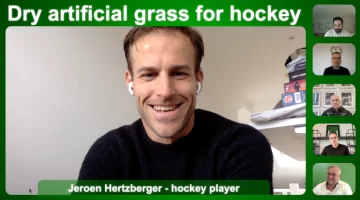One excellent coaching philosophy for the hockey coaching of children is: “Hockey is not so much a competition between our bodies as a celebration of them”. Celebrating our bodies is done through the joys of running, passing, hitting a ball and sharing with friends in the team.
Youth sports thrive on parent-coaches. One estimate finds that parents of players make up 90% of all youth sport coaches. Parental involvement and support is a necessary and important part of a child’s participation in sports. Hockey organizations need parents to coach to keep youth hockey afloat. However, it is a slippery slope!
Coaching your child can be a wonderful experience when handled well by parent-coach and child. The bonding that occurs can strengthen your relationship with your child. However, there is such a thing as too much involvement. It is possible that in the unique environment of youth hockey, having dad, or mom, as coach can push parental involvement toward the over involved end of the continuum. If this is the case, it could create a negative experience for the child-athlete of the parent-coach.
So, why can coaching your child end in conflict?
Separate the Parent From the Coach
One of the biggest challenges a parent-coach faces is the inability to separate those two roles from one another. This can create confusion for the child. To master these roles, and live them independently, start by using environment as a cue for your behavior. You are a coach when on the field, and a parent when you are at home.You must remind yourself to click into your roles depending on the situation. Being unable to move in and out of these roles will create confusion for your child.
As a parent, your job is to provide unconditional love and support. Leave critiques of things that happened in practices and games behind. Try to talk about things other than hockey, such as school, friends, and other hobbies.
Don’t criticize or yell instructions during the hockey game
This only embarrasses your child and adds to the pressure he/she feels. If your child needs some simple feedback, provide it calmly and clearly in a positive way. Tell him/her one or two things to do, not a list of things not to do. Children can only handle a little information at once, so be clear and calm.
Share Responsibility
Plan how you will select your hockey team leaders and how you will both recognize and develop children’s leadership capabilities. Rotate your team captains and vice-captains. Give your hockey players certain responsibilities and involve them in decision making when you can do so.
Plan ahead for this. If you have a captain, how will you select this person. Do the parents and players know how this is done and the skills and qualities you value? Perhaps there is real merit in rotating the captaincy. You will be surprised at some child’s unexpected insights or abilities! Train your captains! Give players tasks of self-responsibility. Consider having a vice-captain. Have a planned program for their development. Can any parents help in this process?
Remember, in a hockey team, no wins unless everyone wins.
Do not define success and failure in terms of winning and losing
When a child performs to his/her potential and loses a hockey game, it is criminal to focus on the outcome and become critical. One of the main purposes of the youth hockey experience is skill acquisition and mastery. If you define success and failure in terms of winning and losing, you’re playing a losing game with your child.
Whose goal is it?
Are their goals and aspirations theirs or yours? How invested are you in their success and failure? It is quite normal to want your child to excel and be as successful as possible. But, you cannot make this happen by pressuring them with your expectations or by using guilt to keep them involved. If they have their own reasons and own goals for participating, they will be far more motivated and therefore far more successful.
Give your child the gift of failure
Our society is generally negative and teaches us that failure is bad, a cause for humiliation and embarrassment, and something to be avoided at all costs. Fear of failure or humiliation causes one to be tentative and non-active. You can’t learn to walk without falling enough times. Teach your child how to view setbacks, mistakes and risk-taking positively and give him/her the key to a lifetime of success.
Teach your child to have a perspective on the sports experience
The sports media in general would like you to believe that sports and winning/losing is larger than life. This lack of perspective frequently trickles down to the youth sport level and young athletes often come away from competition with a distorted view of themselves and how they performed. Parents need to help their children develop realistic expectations about themselves, their abilities and how they played. Losing a hockey game does not mean that the sun will not rise tomorrow.
Maintaining a positive parent-child relationship is not completely under your control, however. The child may have trouble separating your parent and coach roles even if you are doing a good job of it.
There are good reasons to coach your child and not coach your child. Making the decision to coach when your child is on the team is a complex one with no simple answers. Before making a decision you may want to ask yourself some very important questions.
Should I coach my child?
- What do you think the negative and positive aspects of coaching your child will be?
- Knowing my child, how will he or she respond to me as a coach?
- Knowing myself, how well will I be able to separate my roles as coach and parent?
- In what ways could I see myself treating my child differently than other players on the team?
- How will members of the team, including parents, respond to me coaching my own child?
The good news is that there are many positive aspects perceived by both parents and their children that are supportive of the parent-coach / child-athlete relationship. One positive aspect includes being able to spend quality time together. Additionally, the child perceives that he/she gets special attention and praise. Talk to your child about your interest in coaching the team, or another kind of involvement in the team. Be upfront with them and make the decision together.
Remember that playing hockey as a child should be all about growing, developing, having a good time, and learning important social skills. Most children want to play hockey because they enjoy it. If the sport becomes pressure-filled or overly stressful, children may lose interest or even develop serious coping issues that take a lot of the joy out of being a child. Parents, as a hockey coach can help make sure kids stay kids, have fun playing sports and develop new healthy habits with the right balance of encouragement and support.
Never forget, it is easier to build up a child than it is to repair an adult. So hockey coaches and hockey parents choose your words wisely.
Annemieke Zijerveld, MSc
Annemieke is a clinical psychologist and lecturer Sports at StatuMentis. Within the field of sport Annemieke is specialized in team optimization, peak performance and is supporting athletes who are suffering from depression, anxiety disorders and burnout. Annemieke has great interest in the psychological determinants of doping behaviour. Annemieke works on various research programs in this field and is developing several drug prevention programs.
Twitter: @StatuMentis
LinkedIn: www.linkedin.com/in/amzijerveld
—
This article was published at self-pass.com originally
[ss_podcast title=\”Studio Hockey Podcasts\” content=\”episodes\” series=\”studio-hockey\” link_title=\”true\”]


















